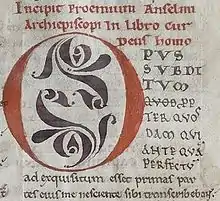
| Part of a series on |
| Scholasticism |
|---|
 |
Cur Deus Homo? (Latin for "Why God Human?"), usually translated Why God Became a Man, is a book written by Anselm of Canterbury in the period of 1094–1098. In this work he proposes the satisfaction view of the atonement.
Anselm says his reason for writing the book is:
I have been often and most earnestly requested by many, both personally and by letter, that I would hand down in writing the proofs of a certain doctrine of our faith, which I am accustomed to give to inquirers; for they say that these proofs gratify them, and are considered sufficient. This they ask, not for the sake of attaining to faith by means of reason, but that they may be gladdened by understanding and meditating on those things which they believe; and that, as far as possible, they may be always ready to convince any one who demands of them a reason of that hope which is in us.[1]
References
- ↑ Cur Deus Homo Preface p. 177 Deane translation of Proslogium etc 1903
External links
- Cur Deus Homo (in Latin)
- Cur Deus Homo (Deane's 1903 translation) (in English)